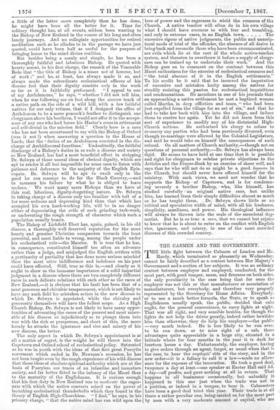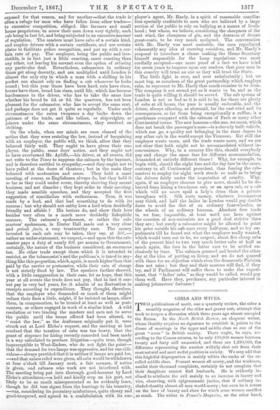THE CABMEN AND THE GOVERNMENT. T HE little fight between the
Cabmen of London and Mr. Hardy, which terminated so pleasantly on Wednesday, cannot be fairly described as a contest between Her Majesty's Government and a section of her subjects. It was an ordinary contest between employer and employed, conducted, for the most part, with good temper, sense, and firmness on both sides, the only peculiarity in the case being that for once the employer was not this or that manufacturer or association of manufacturers, but everybody, and therefore very properly represented by the Secretary for Home Affairs. Everybody. or to use a much better formula, the State, or to speak as Englishmen usually speak, the public, decided that cabs ought, for the general convenience, to carry lights at night. That was all right, and very sensible besides, for though the lights do not help the driver greatly, indeed rather bewilder him than otherwise, they do help his-employer—the public —very mach indeed. He is less likely to be run over, to be run down, or to miss sight of a cab, three advantages quite appreciable in a large city, situated in a latitude where for four months in the year it is dark for fourteen hours a day. Unfortunately, the employer, having to give orders through an agent, forgot, as usual when that is the case, to hear the employe's' side of the story, and in the new order—it is a fallacy to call it a law—made no allow- ance for the expense of the innovation. He took a good deal, twopence a day at least—one speaker at Exeter Hall said 5d. a day—off profits, and gave nothing at all in return. That happens in all businesses occasionally, but unluckily it happened in this one just when the trade was not in a position, or indeed in a temper, to bear it. Cabmasters have been a good deal tried this year. Their trade is at all times a rather peculiar one, being carried on for the most part by men with a very moderate -amount of capital, who are exposed for that reason, and for another—that the trade is often a refuge for men who have fallen from other trades— to excessive competition, obliged, like farmers and small house proprietors, to screw their men down very tightly, each cab being in fact let, and being subjected to an excessive amount of regulation. The masters must have cabs of a certain kind, and employ drivers with a certain certificate, and use certain plates to facilitate police recognition, and put up with a cer- tain rate of pay. The employer, being the public and irre- sistible, is in fact just a little exacting, more exacting than any other, not leaving his servant even the option of refusing any particular deal. Isfevertheless, cabmasters in ordinary times get along decently, and are multiplied until London is almost the only city in which a man -with a shilling in his pocket can almost rely on finding a cab whenever he looks round ; but this year times have been hard, oats have risen, horses have risen, bread has risen, until life, which has become burdensome to the driver, who has to take the same fare whether his bread be 5d. or 9d. the quartern, has not been pleasant for the cabmaster, who has to accept the same rent, and perhaps does not get it quite so regularly. Under such circumstances the extra twopence a day broke down the patience of the trade, and like tailors, or shipwrights, or joiners under the same circumstances, they resolved on striking.
On the whole, when our minds are once cleared of the notion that they were resisting the law, instead of bargaining with an employer, the public will, we think, allow that they behaved fairly well. They ought to have given their em- ployer, the public, some days' notice, and they ought not to have overturned Mr. Ayliffe,—his driver, at all events, did not write to the Times to suppress the cabmen by the bayonet, and is therefore entitled to sympathy,—and they ought not to have yelled at the doors of theatres ; but in the main they behaved with moderation and sense. They held a mass meeting, of course. as Englishmen always do, but they held it as far as they could under cover, thereby showing they meant business, and not disorder ; they kept order in their meeting, they made sensible speeches, and they accepted the first suggestion of conciliation with enthusiasm. True, it was made by a lord, and that had something to do with its success ; but why should not cabby love a lord when decidedly friendly and affable His betters do, and show their love besides very often in a much more decidedly lickspittle manner. The cabmen's spokesmen, or rather the cab- masters' spokesmen, in Exeter Hall made out a very clear and prinui fade, a very trustworthy case. The money invested in each cab may be taken, they say, at 50/.,— rather an under-statement, we suspect,—and upon this the cab- master pays a duty of nearly 20/. per annum to Government, certainly, the nature of the business considered, an enormous tax. No other trade except those which it is intended to restrict, as the tobacconist's and the publican's, is taxed in any- thing like this proportion, which, again, is much higher than that paid by the carrier or postmaster, while their rate of charge is not strictly fixed by law. The speakers further showed, with a little exaggeration in their case, let us hope, that this year at all events the trade does not pay, that in fact it can- not pay in very bad years, for_it admits of no fluctuation in receipts according to expenditure. They thought, therefore, that the employer who demanded so much of them might reduce their fines a little, might, if he insisted on lamps, allow them, in compensation, to be treated at least as well as post- masters, or others engaged in work of a similar kind. A wild resolution or two binding the masters and men not to serve the public until the terms offered had been altered, to "resist the law," as the draftsmen originally put it, were struck out at Lord Elcho's request, and the meeting at last resolved that the taxation of cabs was too heavy, that the grant of sixpence for hiring recently conceded had been made in a way calculated to produce litigation—quite true, though imperceptible to West-Enders, who do not fight the point— that the demand for two lamps was oppressive, and for one ridi- culous—always provided that it is neither if lamps are paid for, —and that unless relief were given, all cabs would be withdrawn at four o'clock till January next, a fair menace, if notice is given, and cabmen who work are not interfered with. The meeting being put into thorough good-humour by Lord Elcho's attendance,—a bold and kindly step on his part, not likely to be so much misrepresented as he evidently fears, r though he did toss cigars from the hustings to his tenantry, —was, considering its pecuniary misfortunes, quite cheery and good-tempered, and agreed to a confabulation with its em- ployer's agent, Mr. Hardy, in a spirit of reasonable concilia- tion specially creditable to men who are believed by a largo section of the public to rely on bullying as a means of liveli- hood; but whom, we believe, considering the sharpness of the east wind, the cheapness of gin, and the dearness of decent great-coats, to be very much maligned. The conversation with Mr. Hardy was most amicable, the men repudiated vehemently any idea of coercing outsiders, and Mr. Hardy's proposal to introduce a clause making the Home Secretary himself responsible for the lamp regulations was most cordially accepted—one more proof of a fact we have tried for seven years to impress upon our readers, that poor men in- this country will trust no one as they will trust the State.
The little fight is over, and over satisfactorily ; but we must beg, as members of the great partnership which employs cabs, to represent to Mr. Hardy that much remains to be done. The company is not served yet as it wants to be, and as the trade is quite willing it should be served. The cab system of London is not so bad as it is said to be, for there are plenty of cabs at all hours, the pace is usually endurable, and the driver, always allowing, as aforesaid, for the east wind and its consequences, so far from being exceptionally a ruffian, is a gentleman compared with the cabman of Paris or many other Continental towns. The new hansom—the one, we mean, which does not break the passenger's nose—is a cleverly built vehicle, which can go, a quality not belonging in the same degree to any other cab in the world except the Viennese. But still the employer wants more, and the trade wants more, and we are not clear that both might not be accommodated without in- convenience. Why, in a country like this, should everybody pay and charge the same fare for different accommodation, demanded at entirely different times ? Why, for example, to begin with, should the night fare and the day fare be the same, contrary to all Continental precedent, thus forcing the cab- masters to employ for night work steeds so unfit as to bring the drivers fairly under the imputation of cruelty. Why,, again, if an employer chooses to give more, should he be de- barred from hiring a two-horse cab, or an open cab, or a cab which will no more spoil a lady's dress than a private brougham will. Silk costs money, whatever ironmasters may think, and half the ladies in. London would pay double area to avoid the dirt of an ordinary four-wheeler, or the wheels of an ordinary hansom. Absolute free trade is, we fear, impossible, at least until our laws against the coercion of non-unionists are a good deal stricter than they are ; but surely a eabmaster might be allowed to paint his price outside his cab once every half-year, and so try ex- periments till he found out what the employer really wanted, which would turn out to be, we suspect, about five cheap cabs of the present kind to two very much better cabs at half as much again, the fare in the latter case to be settled ex- clusively by time. The cabmen groaned and hooted the other. day at the idea of putting on livery, and we do not quarrel with them for an objection which even the democratic Parisian does not raise ; but they and their masters will find, if they try, and if Parliament will suffer them to make the experi- ment, that "ladies' cabs," as they would be called, would pay them well. Have they, perchance, any particular interest in making jobmasters' fortunes ?



































 Previous page
Previous page